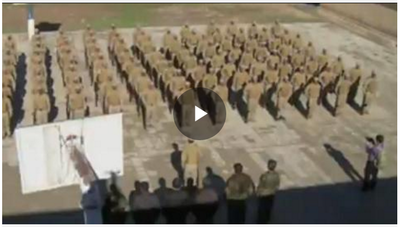The child soldier was fighting against Daesh (ISIL, also known as ISIS) in Amiriyat al-Fallujah, a city 40 kilometres west of Baghdad, where fierce battles have been taking place between Daesh, the Iraqi Army, and the "Popular Mobilisation Forces" - militias allied with the Iraqi government.
On May 14, ISIL suicide bombers attacked the centre of Amiriyat al-Fallujah, killing ten soldiers and militiamen. ISIL is well-known for its use of child soldiers, and its"Cubs of the Caliphate" brigade has been filmed undergoing military training exercises and even taking part in executions.
Iraq has a long history of training underage fighters. Under Saddam Hussein's rule, boys of 12 to 17 known as "Saddam's lion cubs" would attend month-long training during summer breaks.
In December, the United Nations documented hundreds of cases of children recruited in Iraq and used to take part in hostilities. "The reported emergence of ISIL's 'youth wings', with training centres in Iraq and Syria, is extremely worrisome, as is the alleged association of children with Popular Mobilisation Forces."
The United Nations Children's Fund called for "urgent measures" to be taken by the Iraqi government to protect children, including criminalising the recruitment of children.
The ban on child recruitment is found in Protocols I and II of the Geneva Conventions, the Convention on the Rights of the Child and other international agreements. The Statute of the International Criminal Court (ICC) considers "conscripting or enlisting children" a war crime, whether it takes place in international or local armed conflicts.
A woman named Qetu Haji said several members of her family, who are members of the Yazidi religious minority, were captured by Daesh while trying to escape the group's advance in Sinjar. She was told by a relative that her son had been killed and her daughter-in-law enslaved.
Two of her grandsons, aged 12 and 15, were reportedly put in a Daesh military training camp. "It is almost two years now, and I don't know what happened to my grandsons," said Qetu Haji.
Other minors join ISIL's ranks willingly. Abu Muhannad, who lives in Fallujah, said that after a siege on his city by the Iraqi army and allied militias, his 17-year-old son Muhannad told him that "he can't understand why the army of his country is bombing its own people".
Muhannad left the house that night, never to return, and his father suspects he joined an ISIL training camp.
Ten months since his disappearance, the family still has no information on his whereabouts. "They take our children, and leave us in agony of what happened to our boys," said Abu Muhannad. Yet ISIL is not the only group in Iraq that recruits children as soldiers.
So do Iraqi Shia militias aligned with the Iraqi government. While it is not clear whether or not these boys were forced to join the militias, those who spoke to Al Jazeera said many join these militias of their own volition, desiring revenge against ISIL.
Fifteen-year-old Karrar, who refused to give his last name, said he joined the Asa'ib Ahl al-Haq militia, which is fighting with the Popular Mobilization Forces, "to help liberate my people who are being killed by ISIL".
"I fought alongside my brothers to liberate Tikrit and Baiji, and other areas in Salahuddin province, and I will continue fighting with them as long as it takes to claim back all the land from Daesh," said Karrar, who is from Diyala, east of Baghdad. When asked about his young age, he replied: "My age doesn't matter. I am a fighter and I will remain a fighter until Allah grants us victory or martyrdom."
The Th large number of orphans in Iraq is also driving the use of child soldiers. A reportreleased by UNICEF in September 2015 estimated that more than four million Iraqi children have lost at least one parent, and Iraq lacks enough orphanages to host the large number of children who have lost both parents.
In October 2014, the Iraqi Ministry of Labour and Social Affairs announced that it runs just 22 orphanages across the country, and that "these houses are not capable at all of accommodating all those who have lost a parent or both parents".
"The increasing numbers of orphans in the country with the lack of proper care will put them at the mercy of armed militias," said Abir al-Shammari, who runs the Right to Humanity organisation, a Basra-based NGO that operates mainly in southern Iraq. Al-Shammari is critical of the Iraqi government for not funding more orphanages to care for the children.
The Iraqi government has failed to halt militias' recruitment of children. Hawker Jetto, a sociologist and a human rights activist based in Erbil who works in a public aid organisation that deals with human rights in Iraq, argues that Iraq "is clearly violating the Genevaconventions, by neglecting the increasing number of children-soldiers who are recruited by militias affiliated with the government".
Jetto criticises the Iraqi government for not putting "the Popular Mobilisation Forces under the supervision of an official committee, to stop any abuses against children".
Both the Iraqi Ministry of Defence and Ministry of Interior refused to comment on militia recruitment of children, and declined to give estimates of the number of children fighting in the conflict.
Jetto believes that "the government might be as well considered as complicit in the violation of children's rights with militia leaders".
"If the government does not act fast to stop child abuse in the conflict, it must be held accountable."
Source http://www.aljazeera.com/news/2016/05/iraq-child-soldiers-happened-boys-160523122213988.html



 RSS Feed
RSS Feed